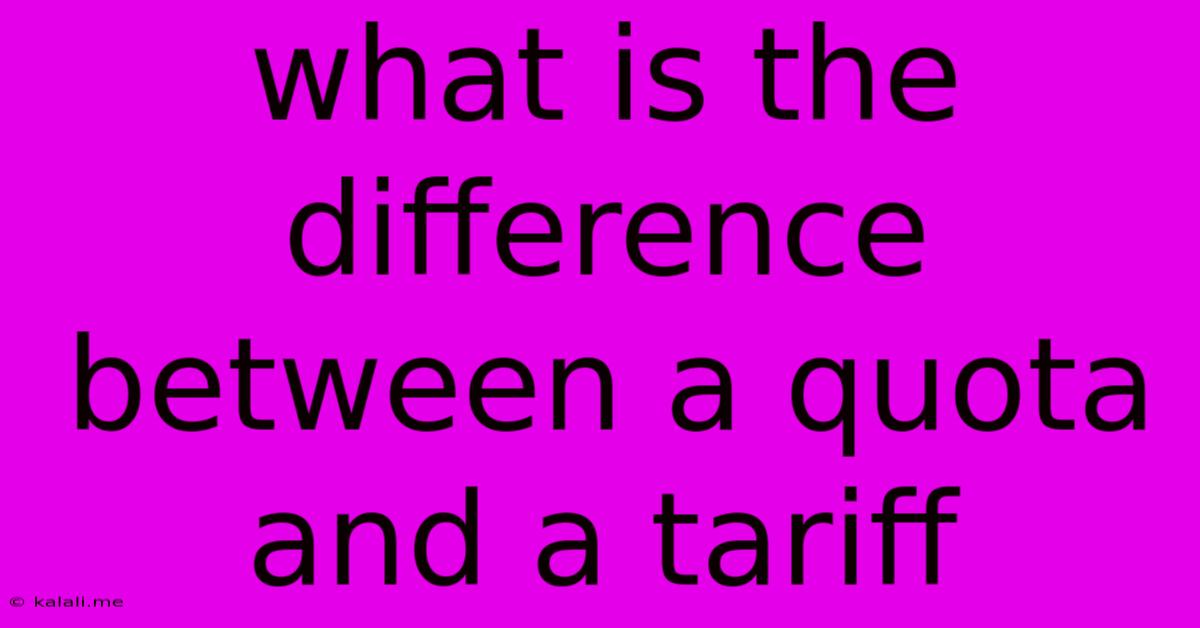What Is The Difference Between A Quota And A Tariff
Kalali
Jun 13, 2025 · 3 min read

Table of Contents
Quotas vs. Tariffs: Understanding the Differences in Trade Restrictions
Meta Description: Confused about the difference between quotas and tariffs? This article clearly explains both trade restriction methods, highlighting their impact on imports, domestic industries, and consumers. Learn how they differ and which one might be more effective under specific circumstances.
Governments employ various tools to manage international trade, with quotas and tariffs being two prominent examples. While both aim to restrict the import of goods, they operate differently and have distinct consequences. Understanding these differences is crucial for grasping their impact on global commerce, domestic industries, and consumers.
What is a Quota?
A quota is a quantitative restriction on the import of a specific good. It limits the total quantity of that good that can be imported within a given period (e.g., a year). Once the quota is filled, no further imports of that particular good are allowed, regardless of demand. Think of it as a fixed cap on the number of imported items.
Examples of Quotas:
- Limiting the number of imported cars from a particular country.
- Restricting the volume of imported textiles.
- Capping the amount of imported agricultural products.
How Quotas Impact the Market
- Increased Prices: By limiting supply, quotas often lead to higher prices for consumers as demand exceeds the available imported goods. Domestic producers may also benefit from higher prices.
- Reduced Consumer Choice: Consumers may have less variety to choose from due to the limited availability of imported goods.
- Potential for Black Market Activity: The scarcity created by quotas can encourage illegal imports and smuggling activities.
- Favoritism Towards Certain Suppliers: Governments sometimes allocate quotas among specific importers, creating potential for favoritism and corruption.
What is a Tariff?
A tariff, on the other hand, is a tax imposed on imported goods. It's a monetary charge added to the price of imported products, making them more expensive for consumers. The tariff amount can be a fixed amount per unit (specific tariff) or a percentage of the value of the goods (ad valorem tariff).
Examples of Tariffs:
- A $10 tax on each imported television.
- A 25% tax on the value of imported steel.
How Tariffs Impact the Market
- Increased Prices: Similar to quotas, tariffs increase the price of imported goods, making domestic products more competitive.
- Reduced Imports: Higher prices due to tariffs can lead to a decrease in the quantity of imported goods. The extent of the reduction depends on the price elasticity of demand.
- Government Revenue: Tariffs generate revenue for the government, unlike quotas which primarily benefit domestic producers.
- Potential for Retaliation: Imposing tariffs can trigger retaliatory measures from other countries, leading to trade wars.
Key Differences Summarized:
| Feature | Quota | Tariff |
|---|---|---|
| Type | Quantitative restriction | Tax on imported goods |
| Impact on Price | Directly increases price by limiting supply | Indirectly increases price by adding a tax |
| Government Revenue | No direct revenue generation | Generates revenue for the government |
| Impact on Supply | Directly limits supply | Influences supply through price changes |
| Transparency | Can be less transparent than tariffs | Generally more transparent |
Conclusion: Choosing Between Quotas and Tariffs
The choice between a quota and a tariff often depends on the specific policy goals. Governments might prefer quotas when aiming for a complete exclusion of a certain product or a strict control over import volume. Tariffs, on the other hand, offer the advantage of generating government revenue and are often considered more transparent than quotas. However, both measures can lead to negative consequences, such as higher prices for consumers and potential for trade disputes. A careful evaluation of the potential benefits and drawbacks is necessary before implementing either a quota or a tariff.
Latest Posts
Latest Posts
-
The More Diverse And Wide Ranging
Jun 14, 2025
-
Elton Mayo Is Known As The Father Of Scientific Management
Jun 14, 2025
-
What Are The Factors For 67
Jun 14, 2025
-
Which Era Is Known As The Age Of Mammals
Jun 14, 2025
-
Bengal Famine Was Caused Due To Which Disease
Jun 14, 2025
Related Post
Thank you for visiting our website which covers about What Is The Difference Between A Quota And A Tariff . We hope the information provided has been useful to you. Feel free to contact us if you have any questions or need further assistance. See you next time and don't miss to bookmark.